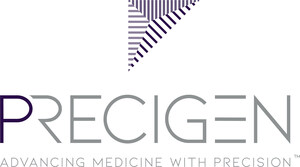Precigen Announces Clearance of IND to Initiate Phase 1/1b Study for First-in-Class PRGN-3006 UltraCAR-T™ Therapy in Patients with Relapsed or Refractory Acute Myeloid Leukemia (AML) and Higher Risk Myelodysplastic Syndrome (MDS)
- First CAR-T therapy to be administered within two days following non-viral gene transfer
- First-in-class therapy for AML
GERMANTOWN, Md., Dec. 21, 2018 /PRNewswire/ -- Precigen, Inc., a wholly-owned subsidiary of Intrexon Corporation (NASDAQ: XON), and a biopharmaceutical company specializing in the development of innovative gene and cellular therapies to improve the lives of patients, today announced that the US Food and Drug Administration (FDA) has cleared the Investigational New Drug (IND) application for PRGN-3006, a first-in-class investigational therapy using Precigen's UltraCAR-T™ platform. PRGN-3006 UltraCAR-T is an autologous chimeric antigen receptor T-cell (CAR-T) therapy for treatment of patients with relapsed or refractory acute myeloid leukemia (AML) and higher risk myelodysplastic syndrome (MDS). PRGN-3006 utilizes Precigen's transformative UltraCAR-T platform, which reduces manufacturing time to less than two days following non-viral gene transfer.
PRGN-3006 UltraCAR-T is a multigenic CAR-T cell treatment utilizing Precigen's clinically-validated Sleeping Beauty system to co-express chimeric antigen receptor, membrane-bound interleukin‐15 (mbIL15), and a kill switch for better precision and control in targeting relapsed or refractory AML and higher risk MDS. This first-in-human Phase 1 dose escalation study to evaluate the safety and maximal tolerated dose of PRGN‐3006 UltraCAR-T will be conducted in collaboration with Moffitt Cancer Center.
"We are eager to investigate the PRGN-3006 UltraCAR-T in these patient populations as current treatment options are limited," said David Sallman, MD, lead investigator for the PRGN-3006 study at the Moffitt Cancer Center. "The PRGN-3006 UltraCAR-T represents the potential of precision medicine to deliver targeted treatment options for this underserved patient population."
Precigen's UltraCAR-T platform has the potential to disrupt the CAR-T treatment landscape by increasing patient access through shortening manufacturing time from weeks to days, decreasing manufacturing-related costs, and improving outcomes using advanced approaches for precise tumor targeting and control of the immune system. The platform brings several key advancements:
- Non-viral gene transfer using multigenic vectors for expression of multiple effector genes leads to better precision and control of tumor targeting and eliminates the need for virus.
- Sustained persistence and desired phenotype of infused UltraCAR-T due to co-expression of mbIL15 helps address T-cell exhaustion, a common issue with current CAR-T therapies.
- T-cell control by incorporation of kill switch technology to potentially improve the safety profile.
- Rapid manufacturing of UltraCAR-T cells using our proprietary non-viral gene transfer process, eliminates the need for ex vivo propagation, thus dramatically reducing wait times for patients from weeks to days.
"With our first-in-human UltraCAR-T IND clearance from the FDA in about a year since our founding we have reached another critical milestone for patients and Precigen," said Helen Sabzevari, PhD, President of Precigen, "We are committed to developing the PRGN-3006 UltraCAR-T as quickly and as efficiently as possible with the goal of providing an effective treatment option for these patients with high unmet need."
Precigen will host a conference call on the morning of December 26, 2018. Details to follow.
About Acute Myeloid Leukemia (AML)
In 2018, nearly 20,000 new cases of AML will be diagnosed in the US, mostly in adults1. AML is among the most common types of leukemia in adults. AML is uncommon before the age of 45 and the average age of diagnosis is about 681. The prognosis for patients with AML is poor with an average 5‐year survival rate of approximately 25 percent overall, and less than a 5 percent 5‐year survival rate for patients older than 652. Amongst elderly AML patients (≥ 65 years of age) median survival is short, ranging from 3.5 months for patients 65 to 74 years of age to 1.4 months for patients ≥ 85 years of age2.
About Myelodysplastic Syndrome (MDS)
MDS are diseases of the bone marrow generally found in adults in their 70s3. Incidence in the US is not known for sure, but estimates range from 10,000 each year and higher3. Using International Prognostic Scoring System (IPSS-R), median survival for MDS patients can vary from less than one year for the "very high" IPSS-R risk group to more than eight years for the "very low" IPSS-R group3.
Precigen : Advancing Medicine with Precision™
Founded in 2017, Precigen is a dedicated discovery and clinical stage biopharmaceutical company advancing the next generation of gene and cellular therapies using precision technology to target the most urgent and intractable diseases in immuno-oncology, autoimmune disorders, and infectious diseases. Our technologies enable us to find innovative solutions for affordable biotherapeutics in a controlled manner. Precigen operates as an innovation engine progressing a preclinical and clinical pipeline of well-differentiated unique therapies toward clinical proof-of-concept and commercialization. Precigen was founded as a wholly-owned subsidiary of Intrexon Corporation (NASDAQ: XON) and leverages Intrexon's proprietary technology platforms to advance human health.
1American Cancer Society. Key Statistics for Acute Myeloid Leukemia (AML). Accessed December 2018 via ACS website.
2Thein, M., et al., Outcome of older patients with acute myeloid leukemia: an analysis of SEER data over 3 decades. Cancer, 2013. 119(15): p.2720-7.
3American Cancer Society. Key Statistics for Myelodysplastic Syndromes. Accessed December 2018 via ACS website.
Precigen Media Contact:
Donelle M. Gregory
[email protected]
SOURCE Precigen, Inc.
WANT YOUR COMPANY'S NEWS FEATURED ON PRNEWSWIRE.COM?
Newsrooms &
Influencers
Digital Media
Outlets
Journalists
Opted In





Share this article